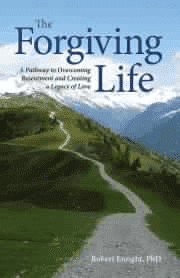"The Forgiving Life," by Robert D. Enright, Ph.D
Robert D. Enright, Ph.D, has a mission. He is one of the leading 'forgiveness warriors' of our times. He has recently published "The Forgiving Life" (2012) Washington, D.C.: American Psychological Association, to offer "a concrete pathway to overcoming resentment and creating a pathway of love." This work is a deep exploration of one of the great malaises of this era - the mindless, and inevitably toxic, recycling of attachments that people develop with stories of "wrongs" suffered at the hands of others. And our alienation or desire for vengeance. To the divorce professionals among us, it rings familiar. I am pleased to share my take of his forgiveness principles with you.
Professor Enright observes that we may become prisoners of our reactivity in ways that impair our functioning (and our potential contributions to society), even though our hurt is a thoroughly reasonable first consequence of being victimized in one way or another. The road of forgiveness offers a potent antidote for freeing our minds and emotions from the tyranny of resentment, and it provides a creative launching point for making peace with our demons and those of others. It promises to liberate our "inner" victim, and to crack a door into a room where a larger shift towards healing and peacemaking can occur.
We live in what seems to be an increasingly angry and insane world. The conflict cycles that resentments spawn are evident by the headlines of each day's newspaper. I remember the teachings of a sociology professor who made a huge impact upon me in college - Richard Flacks, a former founding member of the Students for Democratic Society. When I met him in 1975 "Dick" was an elderly Jewish man who sported a dent at the crown of his balding skull-cap which was caused, he said, by the butt of a handgun wielded by an FBI agent in Chicago during the late '60's. One point that Dick taught was that each of us has the opportunity, perhaps the responsibility, to change the world for the better by accumulating unique "personal histories" one positive choice at a time.
Dr. Enright's forgiveness paradigm very much supports the possibility that we can affect the macro-world in restorative ways. Similarly, forgiveness offers us a way to transform our interactions among those within our circles, and within the chorus of voices that may erupt within our minds. It is hard to imagine how our outer and inner worlds can survive (much less prosper) if we don't incorporate a philosophy of forgiveness into our daily lives.
The rubber of forgiveness hits the road within the realm of divorce and relationship-end. To illustrate the application of his teachings, Enright utilizes the dialogues of a fictional couple who suffer a troubled marriage, and their friend who is de factor 'forgiveness therapist'. Hence, his book is directed to exactly that audience to whom this website speaks, who are those that family law attorneys such as myself exist to assist.
Dr. Enright suggests that forgiveness is a "bottom up" approach to living, not a "top down" approach. While we may feel macro-powerless, we are capable of changing the course of our own personal and ever-unfolding"stories" for the better. Invariably, this can only trickle up into the larger issues of our day.
Dr. Enright reminds us that grace of our individual lives begins with our relationship with ourselves. This is our personal "love story." He writes:
 "Think of your life as an unfolding story, with plots and subplots, with consequences for you and others because of the good and the bad that have occurred and will occur in your life. If common sense; ancient wisdom; philosophical analysis; our modern-day heroes; psychoanalytic thinking; and ... theor(ies) in the social sciences are all correct, then we ... need to take seriously your triumphs, challenges, frustrations, and failures in this area. Each time you have an interaction in which love is present or fails to be present, you add to your life's story.
"Think of your life as an unfolding story, with plots and subplots, with consequences for you and others because of the good and the bad that have occurred and will occur in your life. If common sense; ancient wisdom; philosophical analysis; our modern-day heroes; psychoanalytic thinking; and ... theor(ies) in the social sciences are all correct, then we ... need to take seriously your triumphs, challenges, frustrations, and failures in this area. Each time you have an interaction in which love is present or fails to be present, you add to your life's story.
The beauty of forgiveness is that it allows you to add goodness to your story even when others are intent on polluting your very being with injustices, whether by words, actions, or failures to say or act.... Because forgiveness is a variant of love, it empowers those who are treated unfairly...."
The Forgiving Life demonstrates that Dr. Enright, as a preeminent forgiveness scholar (Time Magazine designated him "the forgiveness trailblazer"), has thought about the subject from near every angle, but importantly in terms practical application. Ultimately, The Forgiving Life is a "how-to" guide for developing a muscle that does require attention in order to function. Dr. Enright suggests "Think of this book as your fitness guide and I as one of your gym instructors. To which chapter would you like to turn as a way of increasing your strength, endurance, and happiness? If your will is strong enough to continue, I will help you develop your legacy."
In my practice as a family law attorney and mediator, I find the biggest hurdle to resolution is people's dogged insistence on remaining invested in the outrage about the perceived and real abuses inflicted upon them by their trusted partners. Yet, who would they be without these stories of victimhood? For some attorneys, particularly those who trumpet their aggressiveness, that rage and hurt are their honey wine and fuel their income stream; resentment is indeed seductive, and even 'profitable'.
Yet for the parties themselves, not to mention their children who pass on the legacy of dysfunction achieved by their parents, hurt and rage are emotionally and financially devastating and there is nothing 'sweet' about it. Enright would have us set aside our bitter cups, and train ourselves to push the "reset" button again and again while managing our cases.
Why does this seem to be so hard? The trance of resentment is familiar and may even seem friendly. Extinguishing it threatens to upend who we think we are. The Forgiving Life reminds us though that that is but just one "story" - like so many others. It is only a slice of the truth, and you've likely noticed that it guarantees wider and unending conflicts.
Lawyers might find that this is a handy little book to have around the office to use as a tool for opening a dialogue with our clients about how to dial down their reactivity. But it is naive to imply that is an easy task (or that I've mastered it). There are so many hooks to get caught on. Which is a good reason for us to have this book lying around as a gentle reminder of how we might alter course, from time to time.
T.W. Arnold, III
P.S.: If any of the foregoing resonates for you, please visit the International Forgiveness Institute.



